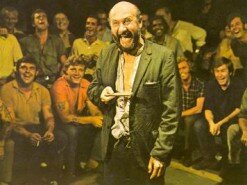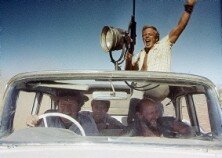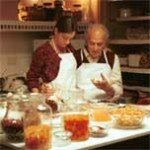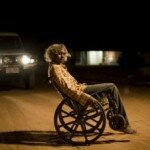Films within cinema’s spectrum that have the most interesting of back-stories are more often than not forgotten over time. This doesn’t exclude the Australian industry, where unless there is a large public interest the stories remain largely untold. Thankfully, the National Film and Sound Archive has taken an interest in resolving the issue and has stepped forward with the digital restoration of Wake In Fright. The history behind this film is remarkable, and audiences deserve to know what a shame it would’ve been had this film been destroyed.
The intrigue doesn’t come from the restoration alone, although it is practically flawless. It comes after a thirty-year search of the original print was found in a Pittsburgh vault marked for destruction followed by a three-year restoration process. For a successful feature its questionable how this was allowed to happen in the first place. The 1971 film was Palme d’Or-nominated and enjoyed a five-month run in Paris; sadly, in Australia the film’s strong themes shocked audiences and it didn’t last long. It stands as an early Ozploitation piece, complete with brief nudity, plenty of ockerisms and a piercing score – but at its heart is a realistic emphasis on Australian culture. The re-release comes almost 40 years after its original run but you realise as you’re watching it that not much has changed. There is still binge drinking and gambling but not all see these as problems within a ‘yobbo’ life. But it’s not for everyone, and Wake In Fright emphasises the chilling details of how culture can change a man.
 |
John Grant’s (Gary Bond) change from prim-and-proper schoolteacher to drunken ‘yobbo’ as he travels from his post in remote Tiboonda to Sydney is shocking, perhaps most to himself. After losing all his money on a game of chance, his overnight stay in Bundanyabba turns into five days of his unravelling. This partly comes from his dissatisfaction of being posted in the most remote of locations, which director Ted Kotcheff immediately establishes. The company John finds himself with is new to him, and as he’s persuaded to push his boundaries he begins to let go of all he knows in favour of acceptance. Amid his personal uncertainties, John finds that he can’t escape the Yabba – they turn him into someone he doesn’t even recognise and he learns to hate himself for it. Yet amongst all this it’s unknown what he eventually learns.
|
|
The direction is reflective of its time but Kotcheff is clever by not revealing all the answers in this thriller, adapted from Kenneth Cook’s 1961 novel. Using the quick montage repeatedly reinforces the idea that fragments of John’s old self linger with the new, while the use of Broken Hill as a stand-in is to effect – complete with a never-ending supply of West End. Audiences today will still be shocked by images of the real and uncut kangaroo shootings (which were done by professionals as part of a cull and not for the film), although also sickeningly intrigued. It’s not for the squeamish – seeing them fall is sad and horrifying, yet you can’t look away. And there is blood. The film is also notable in this release for the rise and fall of not just its main character but its cast. Australian legend Chips Rafferty died shortly after the initial release while Jack Thompson was just beginning in his debut role. Both are good as policeman Jock Crawford and Dick respectively, as are Englishmen Don Pleasence playing the creepy ‘Doc’ Tydon and Bond as John Grant.
The restored version was first screened as part of the Cannes Classics retrospective during the 2009 festival, handpicked by original fan Martin Scorsese. A national release, albeit limited, ensures that local audiences will get to learn about a lost gem of Australian cinema.
Verdict
Wake In Fright should not be missed. It matches with the films of Australia’s stellar run in 2009 and highlights the need for moviegoers to embrace local films both new and old. Let’s hope the NFSA continue with re-releases in the future.
[Rating:4/5]
 Follow the author Katina Vangopoulos on Twitter.
Follow the author Katina Vangopoulos on Twitter.







![A Simple Heart [Un coeur simple] (Review) A Simple Heart [Un coeur simple] (Review)](/wp-content/uploads/coeur3351-150x150.gif)








